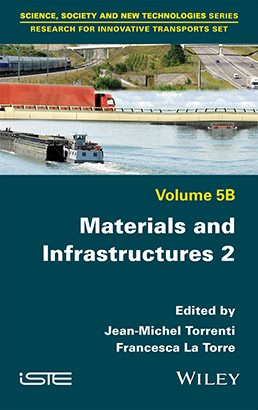
This volume presents the second half of a diverse collection of chapters in the field of materials and infrastructures in transport systems, which illustrate the technological and methodological innovations required to rise to the challenge of building more sustainable transport infrastructures for the future. The authors explore the potential of these sustainable solutions to improve the performance and efficiency of materials and infrastructures, with a reduced environmental impact and lower cost. Theoretical and practical case studies address a variety of topics including circular economy and sustainability, the impacts of climate change, durability, lifecycle, auscultation and the monitoring of infrastructures.
This book provides transport researchers and professionals with a better understanding of the current and future trends in these innovative fields, enabling them to put into practice new technologies and methods of design and management, so that new solutions can become current practices to truly improve modern transport systems.
Part 4. Recycling and Sustainability Issues.
28. Introduction to European COREPASOL Project on Harmonizing Cold Recycling Pavement Techniques, Jan Valentin, Jan Suda, Zuzana Formanová, Konrad Mollenhauer, Michael Engels, Fátima Batista and Ciaran Mcnally.
29. Technical Performance and Benefits of Recycling of Reclaimed Asphalt Containing Polymer-modified Binder in Premium Surface Layers, Greet Leegwater, Jozef Komacka, Gang Liu, Erik Nielsen and Eva Remišova.
30. Case Study: Increasing the Percentage of Recycled Asphalt, Marjan Tušar and Lidija Avsenik.
31. Evaluation of Long-term Glass-grid Test Section using a Unique Method, Maciej Maliszewski, Przemysaw Harasim, Dominika Maliszewska and Adam Zofka.
32. Effect of Using of Reclaimed Asphalt and/or Lower Temperature Asphalt on the Availability of the Road Network, Cliff Nicholls, Matthew Wayman, Konrad Mollenhauer, Ciaran Mcnally, Amir Tabakovic, Amanda Gibney, Aikaterini Varveri, Sean Cassidy, Rea Shahmohammadi and Kevin Gilbert.
33. Brazilian Road Deterioration Test: Final Report, Gustavo Garcia Otto, Leto Momm and Amir Mattar Valente.
Part 5. Railways and Inland Navigation.
34. Application of Different Methods for Rehabilitation of Existing Transition Zones on Old Railway Lines, Marko Vajdic, Duo Liu, Stanislav Lenart and Irina Stipanovic Oslakovic.
35. CAPACITY4RAIL: Toward a Resilient, Innovative and High-capacity European Railway System for 2030/2050, Laurent Schmitt, Fabien Létourneaux, Isabelle De Keyzer and Paul Crompton.
36. Secondary Stiffness of Fastening Clips: Influence on the Behavior of the Railway Track Panel, Konstantinos Giannakos.
37. A New Asset Management Approach for Inland Waterways, Markus Hoffmann, Katrin Haselbauer, Alexander Haberl, Ronald Blab, Markus Simoner, Klaus Dieplinger and Thomas Hartl.
38. 3D Numerical Simulation of Convoy-generated Waves and Sediment Transport in Restricted Waterways, Abdellatif Ouahsine, Ji Shengcheng, Hassan Smaoui, Philippe Sergent and Nicolas Huybrechts.
Part 6. Climate Resilient Roads.
39. Potential Impact of Climate Change on Porous Asphalt with a Focus on Winter Damage, Kyle Kwiatkowski, Irina Stipanovic Oslakovic, Andreas Hartmann and Herbert Ter Maat.
40. Risk Assessment of Highway Flooding in the Netherlands, Dirk Pereboom, Kees Van Muiswinkel and Thomas Bles.
41. Adaptation of the Road Infrastructure to Climate Change, Markus Auerbach and Carina Herrmann.
42. The Impacts of Climate Change on Pavement Maintenance in Queensland, Australia, Gary Chai, Rudi Van Staden, Hong Guan, Greg Kelly and Sanaul Chowdhury.
43. Design Guideline for a Climate Projection Data Base and Specific Climate Indices for Roads: CliPDaR, Christoph Matulla, Joachim Namyslo, Konrad Andre, Barbara Chimani and Tobias Fuchs.
Jean-Michel Torrenti is the R&D director of the Materials and Structures Department of IFSTTAR, and a Professor at Ecole Nationale des Ponts et Chaussées. His research concerns the mechanics of concrete and its coupling with durability aspects, and has been applied to modeling the behavior of structures such as bridges, nuclear power plants and nuclear waste storage. He is the co-author of several books concerning concrete and concrete structures.
Francesca La Torre is Professor of roads, railways and airports at the University of Florence in Italy. She has been working in the field of transportation infrastructures for over 20 years, and is a member of the EC Horizon 2020 advisory group for “Smart, Green and Integrated Transport” and the infrastructures representative for academia in ERTRAC.
Set Coordinator: Bernard Jacob, chair of the Programme Committee of TRA2014, is deputy scientific director for transport, infrastructures and safety with IFSTTAR. His research works are in bridge and road safety, traffic loads on bridges, heavy vehicles and weigh-in-motion. He is Professor at Ecole Nationale des Travaux Publics de l’Etat in France, and President of the International Society for WIM (ISWIM).